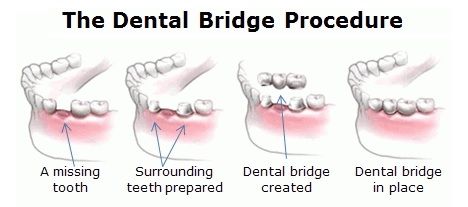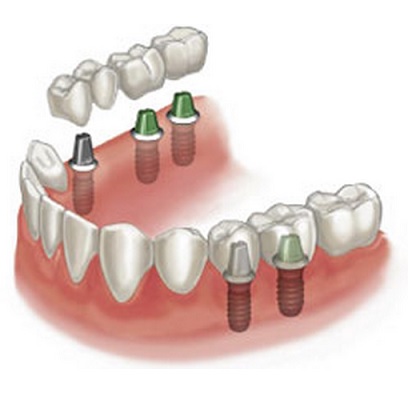Tooth loss may be due to a host of reasons – tooth decay, injury or gingivitis or gum disease. When a person loses a tooth, a permanent replacement is sought. Dentists offer a variety of options including the removable flipper or dentures, a cemented 3-tooth bridge or fixed bridge and dental implants. Most of the dental patients who have lost their tooth for whatever reason are opting for dental implants. It is the optimum choice since it basically replaces the lost tooth with a whole new tooth.
Dental Bridges
Dental bridges literally bridge the gap created by one or more missing teeth. It is made up of two crowns for the teeth on either side of the gap. In dental terms, bridges are made up of abutment teeth or the two anchoring teeth, and a false tooth in between. The false tooth is called pontic and can be made from porcelain, alloy, gold or a combination of these materials. Natural teeth or dental implant support the bridges. While dental bridges can be a good solution for replacing the lost tooth, many people still choose dental implants because of the many advantages they provide.
Dental Implants
A dental implant is a replacement tooth root. It is placed into the jaw through surgery, and the bone grows around and sticks to it through a process called osseointegration. This is what makes the implant strong, proving a solid foundation for fixed or permanent replacement tooth made to match the natural teeth. Dental implants are stronger than a natural tooth and the great thing about it is it does not and never will decay.
Advantages of Dental Implants
Dental implants have several advantages including:
- Improved appearance. Dental implants are made to look like your natural teeth. They will also feel like your own teeth. They become permanent because it fuses with the bone over time.
- Normal dental care. Dental implants are cared for the way natural teeth care cared for – brushing and flossing like a normal tooth. Hygiene for dental bridges is more complex.
- Improved speech. Dental implants allow you to speak without worrying that teeth might slip like in dentures. And because the implant feels like a natural tooth, it will not affect the way a person speaks.
- Improved comfort. Implants eliminate the discomfort of removable of dentures.
- Dental implants allow for easier eating and chewing not worrying about chipping or breaking. Dental implants function like your own teeth so they give no problem in chewing food.
- Improved oral health. Dental implants don’t alter the structure of existing teeth, keeping the strength of the natural teeth intact, improving long-term oral health.
- Durability. Implants are designed to last for many years. With proper oral care, implants can last a lifetime.
Disadvantages of Dental Implants
- Dental implants are more expensive than bridges or dentures.
- Dental implants can fail, if they don’t integrate and fuse with the bone properly. It may cause the development of periodontal disease.
- Dental implants take longer than a few weeks to complete from start to finish. Bridges can be made within 2 weeks.
Because of the certain disadvantages one can go through in getting dental implants, it is but important to consult and let only the best dentist or dental surgeon do the job for you. Remember, dental implant failure may result to periodontal disease so intensified care and carefully choosing your dentist is required.
Here’s a good read to better understand the significance of dental implants.
- St. Lawrence Dentistry Looks Forward To St. Patrick’s Day! - March 12, 2025
- Understanding Dental X-Rays and Radiation: What You Should Know - January 13, 2025
- Happy New Year from St. Lawrence Dentistry! - December 30, 2024











